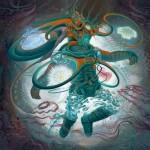
Coheed and Cambria The Afterman: Ascension
(Everything Evil / Hundred Handed Inc.)
My first encounter with Coheed and Cambria was during my preteen years in junior high school. I was perusing the music section of a local department store in New Jersey, when suddenly I came across the holy grail of all albums for a geeky, suburban, white kid like myself. The record was none other than Coheed and Cambria’s In Keeping Secrets Of Silent Earth 3. A quick look at the cover (a dreamy night skyline shrouded in clouds) and a glance at the epic song titles, and I was hopelessly hooked. From then on I began to compulsively buy every album they put out, including The Afterman: Ascension. That being said, Coheed and Cambria have put out a few lack-luster albums in the past and as a dedicated fan I’ve learned to take the good with the bad. Unfortunately, this album displays the band at an absolute low-point in their career.
The production on this album is somewhat disappointing. Michael Birnbaum and Chris Bittner return to the production helm for the first time since the band’s seminal LP, Good Apollo, I’m Burning Star IV Vol. 1, but their presence seems a bit understated. The tight, yet very space-conscious quality that inhabits those first three Coheed records is seemingly nowhere to be found on this outing. Instead, the tracks on this record are pretty heavily compressed. For the most part, this approach successfully transforms the band’s distortion-saturated guitar tones into a muddled mess of indiscernible low-pitch sound. However, the duos old production style does occasionally make an appearance. The song The Afterman has a pretty tasteful arrangement featuring strings, a poppy guitar riff, and some fantastically mixed vocals. Domino The Destitute is also a track that holds up pretty well. The tune has an eerie riff accompanied by a creepy chorus of whispering voices that sort of reminds me of the soundtrack to the movie Suspiria.
The songs are also wrought with all types of unnecessary dialogue and sound effects. The opening track The Hollow particularly suffers from this method. What was a pretty interesting, atmospheric intro track, quickly turns into something a bit corny when the robot-to-human dialogue kicks in. Additionally, the ringside-chatter in the middle of Domino The Destitute and the unwarranted robot-talk at the end of Goodnight Fair Lady and Vic The Butcher serve more as a distraction than a point of intrigue. I understand that the band is adding bits like these in to further convey their underlying space-age tale, but everything here just sounds haphazard and awkwardly placed.
Coheed and Cambria have never really been known for their amazing humanistic lyrical depth, actually they’ve been lauded for quite the opposite. Lead singer Claudio Sanchez usually focuses on weaving intricate tales of intergalactic strife and turmoil over the band’s virtuosic guitar riffs. However, Sanchez’s lyrical approach has taken a turn for the worst on this album. Even with the band’s greater sci-fi concept in mind, Sanchez’s words come off more clumsy than cosmic. Hooks like “Hang your secrets / Hang ‘em up / Hang ‘em up now” are delivered in the band’s typical anthemic style, but lack any of the emotional charge that its predecessors possessed.
Sanchez has seemingly lost his touch in building subtle, yet ambiguous narratives within his lyrics. For example, Goodnight Fair Lady starts out with the heavy-handed line “Good evening ladies and gentlemen / I have a story to tell you...” While the track itself sounds pretty reminiscent of just about any great Thin Lizzy song, borrowing that band’s lyrical elements was a severe misstep. By far the worst tune on this record is Holly Wood The Cracked. The track features one of the laziest guitar riffs the band has ever put to tape. Even the leads from guitarist Travis Stever, one of the most musically consistent members of the band, come off under-thought and uncoordinated. Again, Sanchez drastically falls short on lyrical delivery here. “Holly Wood / Holly Wood / Fucking a loaded gun” is perhaps the most pained chorus ever penned by the band.
Coheed and Cambria is a band that has so closely endeared themselves in my heart that, on some level, I find it entirely inconceivable that they could ever make a truly bad record. However, even the biggest fan of the band can see that this LP has some severe issues. In fact, these issues might be even bigger than the ones on their previous effort, the scorned Year Of The Black Rainbow. What we have here is a band that so desperately tried to make an album that was closer to their previous works that they failed to see the big picture of their current output. Personally, I can’t see why anyone would want to hear a lesser retread of old Coheed songs. I think what the band needs, more than any “return to form,” is time to update and mature their sound, rather than retreat into the nostalgia of their previous material.
12 October, 2012 - 14:59 — Andrew Ciraulo